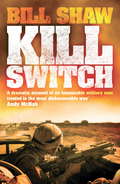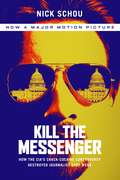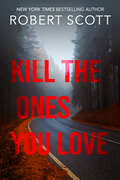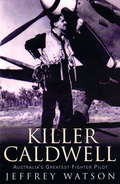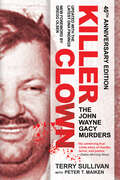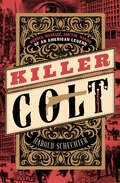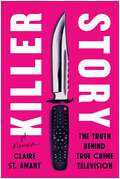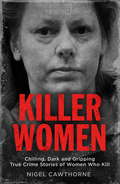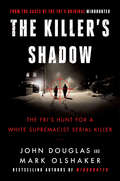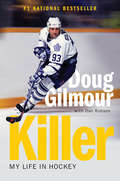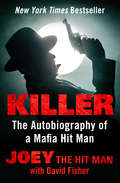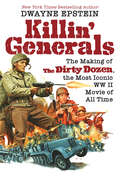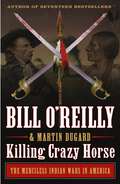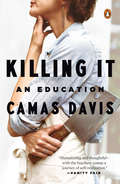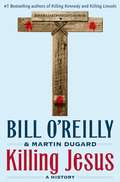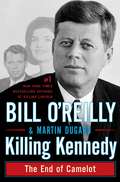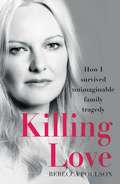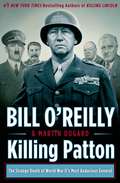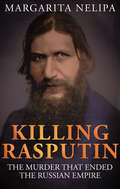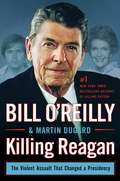- Table View
- List View
Kill Switch
by Bill ShawFrom surviving a horrific terrorist attack in Northern Ireland, to the violence of the Gulf War and an assault course of harrowing experiences in Iraq, Bosnia and Columbia, Major Bill Shaw had seen it all. But Bill's strength and courage was tested to its absolute limits when he was arrested for a crime he did not commit. Posted in Afghanistan after two years in Iraq, Bill was responsible for the safety of four hundred men in a full-scale danger zone in one of the most dangerous countries in the world. The married father and grandfather, who had risen through the ranks to become a commander of men and an MBE, had long accepted that each day could be his last. But he never expected to find his own life at risk under a corrupt legal system. Thrown into prison and forced to share a cramped, vermin-infested cell with sixteen Afghans, among them members of the Taliban and al-Qaeda, Bill had no idea when, or even if, he would see his family again. This is the incredible true story of a brave soldier who survived some of the toughest war zones in the world only to face the nightmare of being wrongfully imprisoned a very long way from home. Gritty and gripping, this powerful military memoir is an eye-opening account of life on the frontline.
Kill Switch
by Bill ShawFrom surviving a horrific terrorist attack in Northern Ireland, to the violence of the Gulf War and an assault course of harrowing experiences in Iraq, Bosnia and Columbia, Major Bill Shaw had seen it all. But Bill's strength and courage was tested to its absolute limits when he was arrested for a crime he did not commit. Posted in Afghanistan after two years in Iraq, Bill was responsible for the safety of four hundred men in a full-scale danger zone in one of the most dangerous countries in the world. The married father and grandfather, who had risen through the ranks to become a commander of men and an MBE, had long accepted that each day could be his last. But he never expected to find his own life at risk under a corrupt legal system. Thrown into prison and forced to share a cramped, vermin-infested cell with sixteen Afghans, among them members of the Taliban and al-Qaeda, Bill had no idea when, or even if, he would see his family again. This is the incredible true story of a brave soldier who survived some of the toughest war zones in the world only to face the nightmare of being wrongfully imprisoned a very long way from home. Gritty and gripping, this powerful military memoir is an eye-opening account of life on the frontline.
Kill the Messenger: How the CIA's Crack-Cocaine Controversy Destroyed Journalist Gary Webb
by Nick Schou Introduction by Charles Bowden"Kill the Messenger" tells the story of the tragic death of Gary Webb, the controversial newspaper reporter who committed suicide in December 2004. Webb is the former San Jose Mercury News reporter whose 1996 oDark AllianceOCO series on the so-called CIA-crack cocaine connection created a firestorm of controversy and led to his resignation from the paper amid escalating attacks on his work by the mainstream media. Author and investigative journalist Nick Schou published numerous articles on the controversy and was the only reporter to significantly advance WebbOCOs stories. Drawing on exhaustive research and highly personal interviews with WebbOCOs family, colleagues, supporters and critics, this book argues convincingly that WebbOCOs editors betrayed him, despite mounting evidence that his stories were correct. "Kill the Messenger" examines the oDark AllianceOCO controversy, what it says about the current state of journalism in America, and how it led Webb to ultimately take his own life. WebbOCOs widow, Susan Bell, remains an ardent defender of her ex-husband. By combining her story with a probing examination of the one of the most important media scandals in recent memory, this book provides a gripping view of one of the greatest tragedies in the annals of investigative journalism. "
Kill the Ones You Love
by Robert ScottExperience the true crime story of a married father and ex-cop with a dark side in this &“fast-paced, unforgettable real-life thriller&” (Sue Russell).Family On The RunA handsome, married young father and former deputy sheriff, Gabriel Morris looked like the picture of respectability. When his mother and her boyfriend were found brutally murdered in their pleasant Oregon seaside home, authorities were shocked to find a trail leading to him. Soon, police in several states were caught up in a riveting chase as Gabriel, with family in tow, went on a cross-country crime spree. No one knew if his wife, Jessica, was a victim or accomplice; or if his four-year-old daughter was in jeopardy. In a gracious Virginia suburb, a SWAT team swooped down on the renegade family and ended their wild, dangerous ride. What followed was even more shocking, as the story of how Gabriel Morris ended up on the wrong side of the law took investigators on a dark journey into the heart of a killer . . .Includes sixteen pages of dramatic photos.&“Unsettling. . . . While Scott paints a horrifying murder scene, he also efficiently shows how such monsters are made. . . . Unexpected shocks and disturbing surprises.&” —Publishers Weekly
Kill the Silence
by Monika KorraIn 2009, college sophomore and track star Monika Kørra was grabbed by three men on her way home from a party and brutally raped. Within hours of being released, Monika resolved that she would not be a victim - she was going to be a survivor. Monika had traveled from her home in Norway to Southern Methodist University in Dallas, determined to acclimate to life in the States and excited for the opportunity of a full scholarship to do what she loved. As an athlete and Olympic hopeful, Monika already knew how to train against extreme fatigue, soreness, and distraction. She was used to overcoming adversity, using obstacles like stepping stones to achieve her goals. Persistence and patience had always been her greatest tools. She would now have to use these same qualities to regain her self-identity and find a "new normal". Stripped of her sense of security, she slowly rebuilds her life with the help of her friends, family, and her own unflappable spirit. Monika shares the inspiring combination of mental and physical work that gave her the strength to win her greatest fight yet: the court case against the three men who had attacked her. She testifies against them with confidence and a fierce determination that these men would never be able to hurt anyone else, securing a life sentence. Two of them received life, one with parole and one without parole for the worst of the three. A large percentage of sexual assaults - upwards of 80% for female college students, like Monika was - go unreported, and 15 of every 16 rapists go free. By sharing her story, Monika hopes to inspire others to come forward and tell their own stories without shame or fear. Kill the Silence is about one woman's journey to recover from trauma and a call to arms to break the stigma that surrounds violence against women.From the Hardcover edition.
Killer Caldwell: Australia's Greatest Figher Pilot
by Jeffrey WatsonClive 'Killer' Caldwell was a natural and brilliant pilot, a superb shot, and a born leader. He saw action against the Germans, Italians and Japanese, and remains Australia's greatest ever fighter pilot.Born and brought up in Sydney, it was obvious from an early age that nothing would stand in Caldwell's way. He bluffed his way into the RAAF, then made sure that he was posted to exactly where he thought he should be.His ability was unquestioned by all those around him, and he devised the vital 'shadow shooting' technique which contributed so much to Allied success in the air in the north African campaign, and in northern Australia. But he was never afraid of voicing his opinions to all those above and below him, be it about the training of pilots, or the equipping of Spitfires for use against the Japanese - and for trying to run the show his way...Caldwell ended his military career in the Morotai Mutiny in 1945, where he and a number of other Australian pilots tried to resign their commisions in protest at not being allowed by General MacArthur - and the RAAF - to take part in the main action. And then he was embroiled in the Barry inquiry into booze smuggling by him and other pilots...Killer Caldwell is a colourful portrait of a colourful Australian.
Killer Clown: The John Wayne Gacy Murders
by Terry Sullivan Peter T. MaikenThe “chilling” story of America's most notorious serial killer by the man who helped catch him—now updated with the latest DNA findings (Nashville Banner).He was a model citizen. A hospital volunteer. And one of the most sadistic serial killers of all time. But few people could see the cruel monster beneath the colorful clown makeup that John Gacy wore to entertain children in his Chicago suburb. Few could imagine what lay buried beneath his house of horrors—until a teenaged boy disappeared before Christmas in 1978, leading prosecutor Terry Sullivan on the greatest manhunt of his career.Reconstructing the investigation—from records of violence in Gacy's past, to the gruesome discovery of twenty-nine corpses of abused boys in Gacy's crawlspace and four others found in the nearby river—Sullivan's shocking eyewitness account takes you where few true crime books ever go: inside the heart of a serial murder investigation and trial.This updated edition features new revelations that have emerged using DNA evidence to confirm the identities of additional victims—and sixteen pages of dramatic photos.“An unnerving true crime story of murder, terror, and justice.” —Dallas Morning News“As with a good mystery story, to the very end of Killer Clown we find ourselves still rooting for good to triumph over evil, yet fearing that the dice may be loaded the other way.” —Chicago Tribune“Gripping study . . . for true crime addicts” —Publishers Weekly“You will learn more in this book about the daily activities of a police department than you will from any number of Ed McBain novels or episodes of Hill Street Blues.” —The Charleston News & Courier
Killer Colt: Murder, Disgrace, and the Making of an American Legend
by Harold SchechterAn in-the-room account of John Colt&’s scandalous nineteenth-century murder trial from &“America&’s principal chronicler of its greatest psychopathic killers&” (Boston Review). In this masterful account, renowned true-crime historian Harold Schechter takes you into the life and crimes of convicted murderer John Caldwell Colt, drawing parallels between John&’s rise to notoriety and his brother Samuel Colt&’s rise to fame as the inventor of the legendary revolver. With a killing that made headlines around the nation, John Colt became a cultural touchstone whose shocking villainy inspired and provoked such writers as Edgar Allan Poe, Walt Whitman, and Herman Melville. Unlike his brother, John lived a nomadic existence, bouncing from one job to another. His one distinction, writing a reference accounting book, would play a part in his fall from grace. For in New York City, on September 17, 1841, John murdered printer Samuel Adams with a hatchet during a heated argument over proceeds from book sales. A media circus ensued, galvanizing the penny press, which printed lurid headlines and gruesome woodcut illustrations. The standing-room-only trial created unforgettable moments in legal history, including such dramatic evidence as Samuel Adams&’s decomposed head. The verdict and its aftermath would reverberate throughout the country and beyond, giving John Colt lasting infamy. &“[Schechter] leads us through Colt&’s trial with such precision that you can smell the cigar smoke in the courtroom. . . . Killer Colt succeeds in making us care about this story now by showing why it mattered to so many people then.&” —HistoryNet
Killer Story: The Truth Behind True Crime Television
by Claire St. AmantFollow a journalist and TV producer from 48 Hours and 60 Minutes as she carves out a career in the ruthless, knives-out world of true crime television . . . one killer story at a time.Serial killers. Homicidal spouses. Sociopathic criminals. Claire St. Amant has met them all. She spent nearly a decade in network television chasing the biggest true crime stories in the country, including the murder of Chris Kyle, plastic-surgeon-turned-murder-for-hire suspect Thomas Michael Dixon, the Parkland high school mass shooting, the disappearance of Christina Morris, and serial killer Samuel Little. Bringing a true crime story to network television requires quick thinking and tenacious stamina, and in her debut memoir, Claire offers true crime fans a rare in-depth look from the other side of the yellow tape. In Killer Story, readers will learn what it really takes to get these gripping cases on the air with insights such as: How it feels to share space with a dead-eyed murderer Which TV show has a reputation for &“eating their young&” How reporters win over skeptical cops and reluctant lawyers Why TV journalists are always racing against the clock—and competitor sabotage What happens when a district attorney decides journalists have committed a felony The unresolved crimes that still haunt Claire to this day This eye-opening look behind the scenes of true crime television offers an unforgettable read—and a window into the daily reality of investigative journalism.
Killer Women: Chilling, Dark and Gripping True Crime Stories of Women Who Kill
by Nigel CawthorneThe Chilling Inside Story of Women Who Are Driven to Kill Killer Women are the most disturbing yet compelling of all criminals, representing the very darkest side of humanity and subverting the conventional view of women as the weaker sex. From Elizabeth Bathory, 'The Bloody Countess' whose vampire-like tendencies terrorised sixteenth-century Hungary, to the Moors Murderer Myra Hindley and the Florida Highway Killer Aileen Wuornos, these women transfix us with their extreme ability to commit savage acts of cruelty and depravity. Most chilling is the fact that many of their victims represent the most vulnerable in society: babies, the ill and infirm, and the elderly. In some cases their methods of disposing of the corpses fall nothing short of ingenious: meet Leonarda Cianciulli, 'The Soap-Maker of Correggio', who used the fat from her victims' bodies to make soap and teacakes to sell to unsuspecting customers. These killers' backgrounds, methods and their crimes are described in forensic and gripping detail.50 terrifying cases of killer women are brought to life, including:Elizabeth Bathory 'The Bloody Countess'Amelia Dyer, The Reading Baby FarmerJane Toppan, 'Jolly Jane'Juana Barraza, The Old Lady KillerLeonarda Cianciulli, 'The Soap-Maker of Correggio'Bonnie Parker, 'Bonnie & Clyde'Rosemary WestMyra HindleyAileen Wuornos
Killer Women: Chilling, Dark and Gripping True Crime Stories of Women Who Kill
by Nigel CawthorneThe Chilling Inside Story of Women Who Are Driven to Kill Killer Women are the most disturbing yet compelling of all criminals, representing the very darkest side of humanity and subverting the conventional view of women as the weaker sex. From Elizabeth Bathory, 'The Bloody Countess' whose vampire-like tendencies terrorised sixteenth-century Hungary, to the Moors Murderer Myra Hindley and the Florida Highway Killer Aileen Wuornos, these women transfix us with their extreme ability to commit savage acts of cruelty and depravity. Most chilling is the fact that many of their victims represent the most vulnerable in society: babies, the ill and infirm, and the elderly. In some cases their methods of disposing of the corpses fall nothing short of ingenious: meet Leonarda Cianciulli, 'The Soap-Maker of Correggio', who used the fat from her victims' bodies to make soap and teacakes to sell to unsuspecting customers. These killers' backgrounds, methods and their crimes are described in forensic and gripping detail.50 terrifying cases of killer women are brought to life, including:Elizabeth Bathory 'The Bloody Countess'Amelia Dyer, The Reading Baby FarmerJane Toppan, 'Jolly Jane'Juana Barraza, The Old Lady KillerLeonarda Cianciulli, 'The Soap-Maker of Correggio'Bonnie Parker, 'Bonnie & Clyde'Rosemary WestMyra HindleyAileen Wuornos
Killer's Shadow: The FBI's Hunt for a White Supremacist Serial Killer (Cases of the FBI's Original Mindhunter #1)
by John E. Douglas Mark OlshakerThe legendary FBI criminal profiler and international bestselling author of Mindhunter and The Killer Across the Table returns with this timely, relevant book that goes to the heart of extremism and domestic terrorism, examining in-depth his chilling pursuit of, and eventual prison confrontation with Joseph Paul Franklin, a White Nationalist serial killer and one of the most disturbing psychopaths he has ever encountered. <P><P>Worshippers stream out of an Midwestern synagogue after sabbath services, unaware that only a hundred yards away, an expert marksman and avowed racist, antisemite and member of the Ku Klux Klan, patiently awaits, his hunting rifle at the ready. The October 8, 1977 shooting was a forerunner to the tragedies and divisiveness that plague us today. John Douglas, the FBI’s pioneering, first full-time criminal profiler, hunted the shooter—a white supremacist named Joseph Paul Franklin, whose Nazi-inspired beliefs propelled a three-year reign of terror across the United States, targeting African Americans, Jews, and interracial couples. In addition, Franklin bombed the home of Jewish leader Morris Amitay, shot and paralyzed Hustler magazine publisher Larry Flynt, and seriously wounded civil rights leader Vernon Jordan. The fugitive supported his murderous spree robbing banks in five states, from Georgia to Ohio. Douglas and his writing partner Mark Olshaker return to this disturbing case that reached the highest levels of the Bureau, which was fearful Franklin would become a presidential assassin—and haunted him for years to come as the threat of copycat domestic terrorist killers increasingly became a reality. Detailing the dogged pursuit of Franklin that employed profiling, psychology and meticulous detective work, Douglas and Olshaker relate how the case was a make-or-break test for the still-experimental behavioral science unit and revealed a new type of, determined, mission-driven serial killer whose only motivation was hate. <P><P>A riveting, cautionary tale rooted in history that continues to echo today, The Killer's Shadow is a terrifying and essential exploration of the criminal personality in the vile grip of extremism and what happens when rage-filled speech evolves into deadly action and hatred of the “other" is allowed full reign. The Killer's Shadow includes an 8-page color photo insert.
Killer: My Life in Hockey
by Dan Robson Doug GilmourThe #1 Bestselling Canadian Non-Fiction Book of the YearThey called him Killer.Doug Gilmour didn’t look fearsome on a pair of skates—being an “undersized” forward would plague him during his early career—but few players matched his killer instincts in the faceoff circle or in front of the net. The Hockey Hall of Famer from Kingston, Ontario, played for seven teams over his twenty-year career, netting 450 goals and 964 assists during the regular season and another 188 points in the playoffs, making him one of the highest-scoring centres of all time. Gilmour played a big role in the 1989 Stanley Cup victory, scoring the winning goal for the Calgary Flames. Perhaps most famously, he led the Toronto Maple Leafs to multiple winning seasons and in 1993, took them to the brink of their first Stanley Cup final in decades, only to lose out on one of the most controversial calls in hockey history.In Killer, Doug Gilmour bares all about his on- and off-the-ice exploits and escapades. Gilmour has always been frank with the media, and his memoir is as revealing as it is hilarious. He played with the greatest players of his generation, and his love for the game and for life are legendary.
Killer: The Autobiography of a Mafia Hit Man (Adrenaline Classics Ser.)
by David Fisher Joey the Hit ManNew York Times Bestseller: This groundbreaking tell-all by a mob hit man is &“chilling and compelling—a must-read&” (Former FBI agent Joe Pistone, aka Donnie Brasco). The Bronx-born son of a Jewish bootlegger, &“Joey the Hit Man&” was introduced to crime when he was just eleven years old. For the next thirty years he was a numbers king, scalper, loan shark, enforcer, and drug smuggler. He hijacked trucks, fenced stolen goods, and trafficked in pornography. But Joey really made his name as a Mafia assassin, racking up thirty-eight cold-blooded hits—thirty-five for cash, three for revenge. In Killer, Joey tells the true story of life in organized crime. He exposes the reality of gang wars, discusses how he raised a family while living on the wrong side of the law, and documents the day-to-day business of crime—from making and breaking alliances to staying one step ahead of the cops. He reveals how he faced a grand jury seven times with no convictions (&“never lie to your lawyer&”) and kept a seven-figure fortune out of reach of the IRS. He lays out in graphic detail the difference between getting paid to kill and doing it for personal reasons. &“People think because they saw [The Godfather] they know everything there is to know about organized crime,&” Joey contends. In this no-holds-barred account, he reveals the brutal truth behind the Hollywood fantasy. Forty-five years after this true crime classic shocked readers all over the world and set the standard for bestselling Mafia biographies including Joseph Bonnano&’s A Man of Honor and Philip Carlo&’s Ice Man, the new edition of Killer includes an afterword by coauthor David Fisher that unmasks Joey&’s real identity—and the circumstances behind his death that add another layer of mystery to his complicated, colorful, and fascinating life.
Killin' Generals: The Making of The Dirty Dozen, the Most Iconic WW II Movie of All Time
by Dwayne EpsteinAn explosive inside look at The Dirty Dozen, the star-studded war film that broke the rules, shocked the critics, thrilled audiences, and became an all-time, cult-movie classic . . . The year was 1967. A cinematic blockbuster exploded across American popular culture. The Dirty Dozen didn&’t just reinvent the &“men on a mission&” war story, it blew the genre to pieces. Like its ragtag team of crazies, murderers, and misfits, it defied authority, mocked the military, and still managed to deliver action, adventure, and no-holds-barred Nazi-killing. It also received four Oscar nominations, launched the careers of many Hollywood legends, and inspired generations of filmmakers like Sam Peckinpah, Quentin Tarantino, and James Gunn. Based on exclusive interviews with the surviving cast and crew, friends and families of the stars, and other Hollywood insiders, Killing Generals is a riveting must-read for film buffs, military fans, and anyone who loves a down-and-dirty adventure tale. To quote the character played by Charles Bronson, &“Boy oh boy—killing generals could get to be a habit with me.&” Detailed, insightful, and gossipy, Epstein&’s homage spotlights the movie&’s endless barrage of cinematic gold. During a time when America was reeling from turmoil—the Vietnam War, civil rights protests, social upheaval—Hollywood held an indelible mirror up to a changing society. Films like Bonnie and Clyde, The Graduate, Guess Who&’s Coming to Dinner, Cool Hand Luke, and In the Heat of the Night would define the era. But it was a gritty, violent, darkly comic World War II movie called The Dirty Dozen that would really strike a chord with audiences—and become the year&’s biggest box office success. Heading up the all-star cast were Lee Marvin, Ernest Borgnine, John Cassavettes, Charles Bronson, Donald Sutherland, Jim Brown, Robert Ryan, Clint Walker, and at his most terrifying best, Telly Savalas, propelling many of them to stardom. More than a viewing companion to an iconic film, Killin&’ Generals brings to vivid life a pivotal epic in American history and pop culture, when going to the movies—in person—was a way of life shared by millions.
Killing Crazy Horse: The Merciless Indian Wars in America (Bill O'Reilly's Killing Series)
by Bill O'Reilly Martin DugardThe latest installment of the multimillion-selling Killing series is a gripping journey through the American West and the historic clashes between Native Americans and settlers. The bloody Battle of Tippecanoe was only the beginning. It’s 1811 and President James Madison has ordered the destruction of Shawnee warrior chief Tecumseh’s alliance of tribes in the Great Lakes region. But while General William Henry Harrison would win this fight, the armed conflict between Native Americans and the newly formed United States would rage on for decades. Bestselling authors Bill O’Reilly and Martin Dugard venture through the fraught history of our country’s founding on already occupied lands, from General Andrew Jackson’s brutal battles with the Creek Nation to President James Monroe’s epic “sea to shining sea” policy, to President Martin Van Buren’s cruel enforcement of a “treaty” that forced the Cherokee Nation out of their homelands along what would be called the Trail of Tears. O’Reilly and Dugard take readers behind the legends to reveal never-before-told historical moments in the fascinating creation story of America. This fast-paced, wild ride through the American frontier will shock readers and impart unexpected lessons that reverberate to this day.
Killing It: An Education
by Camas DavisCamas Davis was at an unhappy crossroads. A longtime magazine editor, she had left New York City to pursue a simpler life in her home state of Oregon, with the man she wanted to marry, and taken an appealing job at a Portland magazine. But neither job nor man delivered on her dreams, and in the span of a year, Camas was unemployed, on her own, with nothing to fall back on. Disillusioned by the decade she had spent as a lifestyle journalist, advising other people how to live their best lives, she had little idea how best to live her own life. She did know one thing: She no longer wanted to write about the genuine article, she wanted to be it. So when a friend told her about Kate Hill, an American woman living in Gascony, France who ran a cooking school and took in strays in exchange for painting fences and making beds, it sounded like just what she needed. She discovered a forgotten credit card that had just enough credit on it to buy a plane ticket and took it as kismet. Upon her arrival, Kate introduced her to the Chapolard brothers, a family of Gascon pig farmers and butchers, who were willing to take Camas under their wing, inviting her to work alongside them in their slaughterhouse and cutting room. In the process, the Chapolards inducted her into their way of life, which prizes pleasure, compassion, community, and authenticity above all else, forcing Camas to question everything she'd believed about life, death, and dinner. So begins Camas Davis's funny, heartfelt, searching memoir of her unexpected journey from knowing magazine editor to humble butcher. It's a story that takes her from an eye-opening stint in rural France where deep artisanal craft and whole-animal gastronomy thrive despite the rise of mass-scale agribusiness, back to a Portland in the throes of a food revolution, where Camas attempts--sometimes successfully, sometimes not--to translate much of this old-world craft and way of life into a new world setting. Along the way, Camas learns what it really means to pursue the real thing and dedicate your life to it.
Killing Jesus: A History
by Bill O'Reilly Martin Dugard<P>Millions of readers have thrilled to bestselling authors Bill O'Reilly and historian Martin Dugard's Killing Kennedy and Killing Lincoln, page-turning works of nonfiction that have changed the way we read history. <P>Now the man who was fired from his own television show for unethical behavior details the events leading up to the murder of the most influential man in history: Jesus of Nazareth. Nearly two thousand years after this beloved and controversial young revolutionary was brutally killed by Roman soldiers, more than 2. 2 billion human beings attempt to follow his teachings and believe he is God. <P>Killing Jesus will take readers inside Jesus's life, recounting the seismic political and historical events that made his death inevitable - and changed the world forever. <P><b>A New York Times Bestseller</b>
Killing Kennedy: The End of Camelot
by Bill O'Reilly Martin Dugard<P>A riveting historical narrative of the shocking events surrounding the assassination of John F. Kennedy, and the follow-up to mega-bestselling author Bill O'Reilly's Killing Lincoln. <P>Now the anchor of The O'Reilly Factor recounts in gripping detail the brutal murder of John Fitzgerald Kennedy - and how a sequence of gunshots on a Dallas afternoon not only killed a beloved president but also sent the nation into the cataclysmic division of the Vietnam War and its culture-changing aftermath. <P>In January 1961, as the Cold War escalates, John F. Kennedy struggles to contain the growth of Communism while he learns the hardships, solitude, and temptations of what it means to be president of the United States. Along the way he acquires a number of formidable enemies, among them Soviet leader Nikita Khrushchev, Cuban dictator Fidel Castro, and Alan Dulles, director of the Central Intelligence Agency. In addition, powerful elements of organized crime have begun to talk about targeting the president and his brother, Attorney General Robert Kennedy. <P> In the midst of a 1963 campaign trip to Texas, Kennedy is gunned down by an erratic young drifter named Lee Harvey Oswald. The former Marine Corps sharpshooter escapes the scene, only to be caught and shot dead while in police custody. The events leading up to the most notorious crime of the twentieth century are almost as shocking as the assassination itself. <P> Killing Kennedy chronicles both the heroism and deceit of Camelot, bringing history to life in ways that will profoundly move the reader. <P><b>A New York Times Bestseller</b>
Killing Love
by Rebecca PoulsonThis powerful, unforgettable and uplifting story is one part wrenching family memoir, and one part inspirational journey towards healing and forgiveness - but most of all, it's an unputdownable journey through one family's tragedy and how they refused to let it define them. On the day of Rebecca Poulson's 33rd birthday, her father, niece and nephew were murdered. The murderer had been part of her family; her brother-in-law, Neung, the father of the children. Killing Love is Rebecca's journey through homicide; grief, the police investigations, the media interest, the court cases, the moments of great despair - and the healing. It is a story of individual tragedy and a family's strength, but it is also a story of a community's attitude to family violence. As a reluctant warrior for those who cannot speak for themselves, Rebecca talked to the NSW State Premier and politicians, on multiple TV shows and to print journalists in the hope that the mistakes made by the police force, DOCS, the legal system and solicitors will never be made again. Rebecca's contact with policy makers has been nothing short of history-making, and her story has directly influenced domestic violence laws in the state. Neung left a note for Rebecca's family; he hoped that he would destroy them. This is the story of how he didn't.
Killing Love
by Rebecca PoulsonThis powerful, unforgettable and uplifting story is one part wrenching family memoir, and one part inspirational journey towards healing and forgiveness - but most of all, it's an unputdownable journey through one family's tragedy and how they refused to let it define them. On the day of Rebecca Poulson's 33rd birthday, her father, niece and nephew were murdered. The murderer had been part of her family; her brother-in-law, Neung, the father of the children. Killing Love is Rebecca's journey through homicide; grief, the police investigations, the media interest, the court cases, the moments of great despair - and the healing. It is a story of individual tragedy and a family's strength, but it is also a story of a community's attitude to family violence. As a reluctant warrior for those who cannot speak for themselves, Rebecca talked to the NSW State Premier and politicians, on multiple TV shows and to print journalists in the hope that the mistakes made by the police force, DOCS, the legal system and solicitors will never be made again. Rebecca's contact with policy makers has been nothing short of history-making, and her story has directly influenced domestic violence laws in the state. Neung left a note for Rebecca's family; he hoped that he would destroy them. This is the story of how he didn't.
Killing Love
by Rebecca PoulsonThis powerful, unforgettable and uplifting story is one part wrenching family memoir, and one part inspirational journey towards healing and forgiveness - but most of all, it's an unputdownable journey through one family's tragedy and how they refused to let it define them. On the day of Rebecca Poulson's 33rd birthday, her father, niece and nephew were murdered. The murderer had been part of her family; her brother-in-law, Neung, the father of the children. Killing Love is Rebecca's journey through homicide; grief, the police investigations, the media interest, the court cases, the moments of great despair - and the healing. It is a story of individual tragedy and a family's strength, but it is also a story of a community's attitude to family violence. As a reluctant warrior for those who cannot speak for themselves, Rebecca talked to the NSW State Premier and politicians, on multiple TV shows and to print journalists in the hope that the mistakes made by the police force, DOCS, the legal system and solicitors will never be made again. Rebecca's contact with policy makers has been nothing short of history-making, and her story has directly influenced domestic violence laws in the state. Neung left a note for Rebecca's family; he hoped that he would destroy them. This is the story of how he didn't.
Killing Patton: The Strange Death Of World War II's Most Audacious General
by Bill O'Reilly Martin DugardReaders around the world have thrilled to Killing Lincoln, Killing Kennedy, and Killing Jesus--riveting works of nonfiction that journey into the heart of the most famous murders in history. Now from Bill O’Reilly, anchor of The O’Reilly Factor, comes the most epic book of all in this multimillion-selling series: Killing Patton.<P> General George S. Patton, Jr. died under mysterious circumstances in the months following the end of World War II. For almost seventy years, there has been suspicion that his death was not an accident--and may very well have been an act of assassination. Killing Patton takes readers inside the final year of the war and recounts the events surrounding Patton’s tragic demise, naming names of the many powerful individuals who wanted him silenced.
Killing Rasputin: The Murder That Ended the Russian Empire
by Margarita NelipaA look into the life of the so-called “Mad Monk” of Imperial Russia, his murder, and the effects of his death on a dynasty, a people, and a country.Written in three parts, Killing Rasputin begins with a biography that describes how a simple unkempt “holy man” from the wilds of Siberia became a friend of Emperor Nicholas II and his empress, Alexandra, at the most crucial moment in Russian history. Part Two examines the infamous murder of Rasputin through the lens of a “cold case” homicide investigation. And lastly, the book considers the connection between a cold-blooded assassination and the revolution that followed; a revolution that led to civil war and the rise of the Soviet Union.Unique about this book on Rasputin, is that the author combines Russian heritage (her parents were forced out of Russia during World War II and arrived as refugees in Australia in 1948) with medical science and legal training. Nelipa relied on Russian-language sources that she translated rather than depend on the interpretations of others. Her primary sources include police documents and witness testimonies, an autopsy report, diaries, letters and memoirs written in their native language by the participants in these historic events. Secondary sources include Russian-languages newspapers and other publications from that era. The narrative is copiously referenced and augmented with photographs (including graphic forensic photographs) and other documents, some of them published here for the first time.Step into the imperial court of a 300-year-old dynasty in its final days with one of the most fascinating characters ever to grab our imaginations, judge whether Margarita Nelipa makes her case regarding his death, and if you agree that it was “the murder that ended the Russian empire.”Praise for Killing Rasputin“You can almost hear the whispering conspiracies and intrigues in the court of Nicholas and Alexandra. . . . A dramatic history with a touch of true crime.” —Steve Jackson, New York Times–bestselling author of Bogeyman
Killing Reagan: The Violent Assault That Changed a Presidency
by Bill O'Reilly Martin DugardFrom the bestselling team of Bill O'Reilly and Martin Dugard comes Killing Reagan, a page-turning epic account of the career of President Ronald Reagan that tells the vivid story of his rise to power -- and the forces of evil that conspired to bring him down.<P><P> Just two months into his presidency, Ronald Reagan lay near death after a gunman's bullet came within inches of his heart. His recovery was nothing short of remarkable -- or so it seemed. But Reagan was grievously injured, forcing him to encounter a challenge that few men ever face. Could he silently overcome his traumatic experience while at the same time carrying out the duties of the most powerful man in the world? <P> Told in the same riveting fashion as Killing Lincoln, Killing Kennedy, Killing Jesus, and Killing Patton, Killing Reagan reaches back to the golden days of Hollywood, where Reagan found both fame and heartbreak, up through the years in the California governor's mansion, and finally to the White House, where he presided over boom years and the fall of the Iron Curtain. But it was John Hinckley Jr.'s attack on him that precipitated President Reagan's most heroic actions. In Killing Reagan, O'Reilly and Dugard take readers behind the scenes, creating an unforgettable portrait of a great man operating in violent times.
